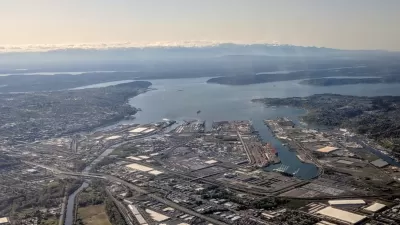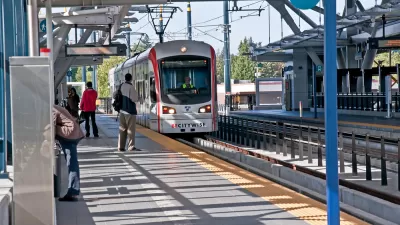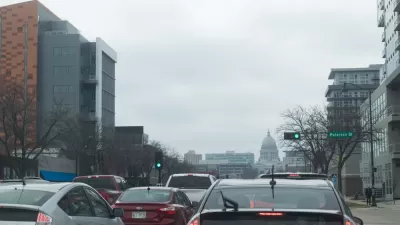Washington state voters expecting to see their vehicle registration fees drop to $30 on Thursday due to the passage of Initiative 976 on Nov. 5 might have to wait much longer after a King County Superior Court judge put the measure on hold.

"Voters across Washington [last] month approved Initiative 976, which attempted to lower many vehicle registration fees to $30, roll back car-tab taxes that fund Sound Transit and do away with local car-tab fees," reported Heidi Groover for The Seattle Times. It passed with nearly 53% of the vote. The measure was set to take effect on Dec. 5.
That means vehicle owners across Washington will be expected to pay existing higher fees for now. State tax collectors, meanwhile, will set aside some of those fees in case they later have to issue refunds.
Title of ballot misleading
Confusion over voter-approved local car tabs (vehicle registration fees) led King County Superior Court Judge Marshall Ferguson to issue the junction on Nov. 27. Doug Trumm, publication director for The Urbanist, a Seattle-based nonprofit, reports:
“The ballot title states that ‘voter-approved charges’ are excepted from the $30 limit on motor vehicle license fees, but Section 2 of I-976 indicates that only charges approved by voters after the effective date of I-976 are excepted from the $30 limit,” Judge Ferguson wrote in his decision [pdf][.
“In other words, all existing voter approved charges are apparently extinguished by I-976, even though the ballot title suggests that all voter approved charges, past or future, survive I-976.”
However, the ballot title and summary were assigned by the state Attorney General's office, as opposed to the initiative's author and promotor, Tim Eyman, and now a gubernatorial candidate. Attorney General Bob Ferguson (no relation to the judge indicated), who is defending the initiative on behalf of the voters, "is filing an emergency appeal asking the state Supreme Court to overturn the lower court's decision," reported Melissa Santos of Crosscut. "The state is asking the high court to instead let the initiative go into effect as scheduled."
State transportation cuts to take effect
"In Olympia, state lawmakers said they would move ahead as if the measure was taking effect despite the ruling," adds Grover. "If the initiative takes effect, it is expected to cut about $478 million in state transportation revenues over the next two years."
Under instructions from Inslee, the Washington State Department of Transportation has put dozens of roads and transit projects that are not yet underway on hold while lawmakers adjust state budgets.
The [court] fight could also further scramble the upcoming state legislative session, where lawmakers will have to reconsider state transportation spending and some Republicans are already demanding legislators enact the tax cut regardless of legal challenges.
King County transit cuts put on pause
Trumm reports that the "175,000 hours worth of transit service cuts in the county" will be spared and that "Sound Transit got an even bigger reprieve" in terms of the initiative's impact on the Motor Vehicle Excise Tax collected by the transit agency, which was not a party to the suit filed by King County, Seattle, and several others groups and one individual.
Update: Grover reports on Dec. 2 that AG Ferguson filed an emergency motion with the state Supreme Court to let the initiative take effect as intended on Thursday.
Related in Planetizen:
Hat tip to Tim Gould.
FULL STORY: Tim Eyman’s car-tab measure on temporary hold, judge orders

Alabama: Trump Terminates Settlements for Black Communities Harmed By Raw Sewage
Trump deemed the landmark civil rights agreement “illegal DEI and environmental justice policy.”

Planetizen Federal Action Tracker
A weekly monitor of how Trump’s orders and actions are impacting planners and planning in America.

Why Should We Subsidize Public Transportation?
Many public transit agencies face financial stress due to rising costs, declining fare revenue, and declining subsidies. Transit advocates must provide a strong business case for increasing public transit funding.

Understanding Road Diets
An explainer from Momentum highlights the advantages of reducing vehicle lanes in favor of more bike, transit, and pedestrian infrastructure.

New California Law Regulates Warehouse Pollution
A new law tightens building and emissions regulations for large distribution warehouses to mitigate air pollution and traffic in surrounding communities.

Phoenix Announces Opening Date for Light Rail Extension
The South Central extension will connect South Phoenix to downtown and other major hubs starting on June 7.
Urban Design for Planners 1: Software Tools
This six-course series explores essential urban design concepts using open source software and equips planners with the tools they need to participate fully in the urban design process.
Planning for Universal Design
Learn the tools for implementing Universal Design in planning regulations.
Caltrans
Smith Gee Studio
Institute for Housing and Urban Development Studies (IHS)
City of Grandview
Harvard GSD Executive Education
Toledo-Lucas County Plan Commissions
Salt Lake City
NYU Wagner Graduate School of Public Service





























